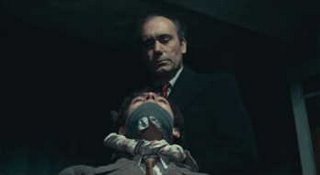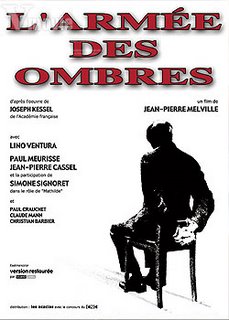

A few days ago "She Who Must Not Be Named" and I went with a friend to see "Army of Shadows." It's a classic of European cinema -- directed by Jean-Pierre Melville; starring Lino Ventura, Paul Meurisse and Simone Signoret; based on a novel by Joseph Kessel, author of Belle de jour. I had heard wonderful things about it for decades, but had never seen it.
Here's a sample of critics' reactions:
Glenn Whip -- "Movies don't get any better than this."You get the idea -- This is one I was really up for, and it let me down.
Michael Wilmington -- "Overwhelming..., a classic of life."
Kenneth Turan -- "Masterfully made, with no detail unattended."
As I left the theatre the question that occupied my mind was "how can so many people whose opinion I respect praise this thing so extravagently?" To be sure the acting is above par, although mostly it consists of sraring moodily into the distance; the cinematography is superb, muted colors that reflect the darkness of the subject; the subject is certainly weighty enough, a story illustrating the moral dilemmas faced by members of the French underground as they forced to face horrifying situations; and there is a hefty existential undertone to sate the appetites of those few who still take such silliness seriously.
And that is part of my problem.
This is a period piece.
At the time it was made (1969) existentialism was still all the rage and taken seriously; the French underground was still thought of in heroic terms and a substantial portion of the European public still saw the Communists as the good guys; and of course the New Wave was in full flower, even if it was beginning to tatter a bit around the edges.
Today all those affectations seem mildly ridiculous, and so does "Army of Shadows." If you are old enough (and I am..., I am) you might remember how exhilarating the revolutionary editing in Godard's Breathless was. Cross cutting, jump cuts, hand held shots, looping, reversing directions during a chase..., take that D. W. Griffith!!!! So much for your stuffy old film "grammar." We're being "creative" here.
Well, nine years later, those things were not so new any more. Eliminating transition shots no longer quickened the pulse..., it only made the narrative choppy.
And that is one of the problems I have with "Army" [I almost wrote, "Of Darkness"]. It is choppy and episodic. You will have a long sequence in which very little happens. The camera is static, the characters spend a lot of time pacing slowly while staring off moodily into the dark distance or sitting quietly in a harshly lit room casting significant glances at one another. Then there is a burst of New Wavery, a staccato series of jump shots, and then somber stasis again.
I know that there is a lot of subtle stuff going on here -- the characters are pondering deep existential dilemmas, and the audience is meant to consider the impending crisis along with them, and the form of exposition emphasizes mood over narrative drive. All that is legitimate, but too much of a good thing is still too much, and all too often you are often left thinking "For God's sake..., do something!"
And then there is the problem of absurdity -- not existential absurdity, although there is a lot of that, but sheer narrative loopiness.
An example:
In a long early sequence our heroes expose a traitor and are determined to kill him. They need to do so without attracting the attention of authorities, so they rent an empty house surrounded by other vacant structures where they will do the deed. But when they arrive with their prey, they find a family of squatters has moved in next door to their house. They then engage in a long discussion of how to kill the guy, debating differing methods, and searching the building for implements, finally deciding to choke him with a kitchen towel.
I emphasize that the whole episode is not played for laughs [one can imagine what Peter Sellers would have done with the situation], but is deadly serious.
Through the whole long episode the traitor has walked, unbound and ungagged, freely accompanying his killers past numerous witnesses, and in the dark death room he stands quietly for several minutes while his killers debate ways to end his life. If at any point he had shouted or screamed or run or done anything to attract attention he would have lived, but he remained quiet and died a terrible, agonizing death. Is there a philosophical point being dramatized here, or is it just incompetent writing? I suspect the latter.
And I haven't even mentioned the major groaner -- the sudden, magical appearance in an execution chamber of a rope, which our hero, who has just been shot in the bicep, easily climbs to safety. Afterwards he looks questioningly at his rescuerer, who simply says "we were well informed." Indeed! Again we have a scene that could be played for laughs -- imagine a Monty Python version -- but it is presened in a deadly serious tone, and the audience is left to think, "Oh come on, now..., you expect us to swallow that?"
And finally, there is the problem of history. We now know a lot more about the French underground than we did back when this film was made. "Army" assumes that the audience shares the film-makers' sensibilities and simply accepts the iconic heroism of the main characters and the inherent villany of their victims and antagonists. That was probably true in 1969. But this is not 1969 and if the characters are to be more than shallow icons some development is in order. Those long, moody pauses could have been filled with bits of business that would have told us something about these people other than the fact that they will do anything for the cause.
This is a shallow, adolescent, and empty film. The characters are one-dimensional, the crises simplistic, morality nonexistent, the narrative nonsensical. What we are left with is a political polemic riddled with vast empty spaces into which we can insert our own meanings. I don't mind a film that asks the audience to do some work, but here the viewer has to do all of the heavy lifting.
And, come to think of it, that is what excites the critics. The film purports to be a view into the abyss..., but what the viewer really sees is his own reflection smiling back at him, and that, my friends, is always something exciting to behold.
No comments:
Post a Comment